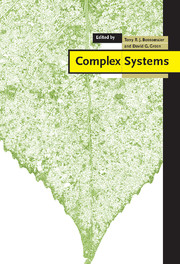Book contents
- Frontmatter
- Contents
- 1 Introduction
- 2 Self-organisation in complex systems
- 3 Network evolution and the emergence of structure
- 4 Artificial life: growing complex systems
- 5 Deterministic and random fractals
- 6 Non-linear dynamics
- 7 Non-linear control systems
- 8 Parallel computers and complex systems
- 9 Are ecosystems complex systems?
- 10 Complexity and neural networks
- Index
9 - Are ecosystems complex systems?
Published online by Cambridge University Press: 04 August 2010
- Frontmatter
- Contents
- 1 Introduction
- 2 Self-organisation in complex systems
- 3 Network evolution and the emergence of structure
- 4 Artificial life: growing complex systems
- 5 Deterministic and random fractals
- 6 Non-linear dynamics
- 7 Non-linear control systems
- 8 Parallel computers and complex systems
- 9 Are ecosystems complex systems?
- 10 Complexity and neural networks
- Index
Summary
Introduction
It is the living world that first confronts us with real complexity. From coral reefs to rainforests, complex patterns are evident everywhere in the living world. Their intricacy and beauty has always astounded us. Ecology – the study of plants and animals in their environment – emerged as a distinct discipline at the beginning of the twentieth century. Its subject is nothing less than the complexity of the living world itself. Ecology attempts to link patterns to processes. The hope is that hidden within the complexity living systems lie patterns that will enable us to understand the biological processes involved.
In this brief introduction to complexity in ecology we introduce some of the key issues, especially those that relate most closely to the subject of complexity in general.
What is ecological complexity?
Ecological complexity arises from several sources. These include:
the sheer abundance of plants and animals – both in numbers and kinds;
the richness of the interactions between individuals and populations;
the wide variations in environmental conditions that affect organisms and
the many different kinds of processes that occur in nature.
Ecologists have taken a variety of approaches to dealing with complexity. Below we look briefly at some of these.
Why is taxonomy relevant?
Our first response to complexity is taxonomy. Whatever the subject we attempt to order and classify phenomena so that we may see a pattern. It is not surprising that taxonomy grew out of biology. Systematic biology – the science of classifying species – represents perhaps the oldest tradition in our attempts to understand the complexity of the living world.
Information
- Type
- Chapter
- Information
- Complex Systems , pp. 339 - 366Publisher: Cambridge University PressPrint publication year: 2000
Accessibility standard: Unknown
Why this information is here
This section outlines the accessibility features of this content - including support for screen readers, full keyboard navigation and high-contrast display options. This may not be relevant for you.Accessibility Information
- 9
- Cited by
